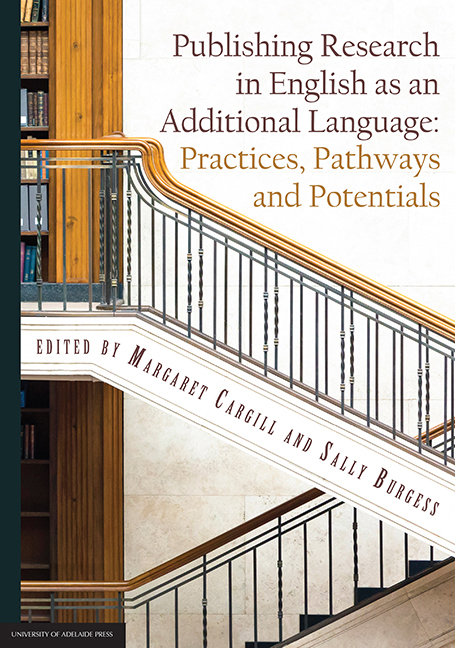Book contents
- Frontmatter
- Contents
- List of contributors
- Acknowledgements
- Foreword
- Introduction: Unpacking English for Research Publication Purposes [ERPP] and the intersecting roles of those who research, teach and edit it
- 1 Accept or contest: A life-history study of humanities scholars’ responses to research publication policies in Spain
- 2 Introducing research rigour in the social sciences: Transcultural strategies for teaching ERPP writing, research design, and resistance to epistemic erasure
- 3 Blurring the boundaries: Academic advising, authors’ editing and translation in a graduate degree program
- 4 The delicate art of commenting: Exploring different approaches to editing and their implications for the author-editor relationship
- 5 The CCC Model (Correspondence, Consistency, Correctness): How effective is it in enabling and assessing change in text-editing knowledge and skills in a blended-learning postgraduate course?
- 6 How credible are open access emerging journals? A situational analysis in the humanities
- 7 Disseminating research internationally: Intra-subdisciplinary rhetorical structure variation in immunity and allergy research articles
- 8 Scientists publishing research in English from Indonesia: Analysing outcomes of a training intervention to inform institutional action
- 9 ‘The one who is out of the ordinary shall win’: Research supervision towards publication in a Chinese hospital
- 10 The geopolitics of academic plagiarism
- 11 Training ‘clerks of the [global] empire’ for 21st-century Asia? English for Research Purposes (ERP) in Vietnam
- 12 Standardisation and its discontents
- Reflections and future directions in publishing research in English as an Additional Language: An afterword
12 - Standardisation and its discontents
Published online by Cambridge University Press: 16 March 2018
- Frontmatter
- Contents
- List of contributors
- Acknowledgements
- Foreword
- Introduction: Unpacking English for Research Publication Purposes [ERPP] and the intersecting roles of those who research, teach and edit it
- 1 Accept or contest: A life-history study of humanities scholars’ responses to research publication policies in Spain
- 2 Introducing research rigour in the social sciences: Transcultural strategies for teaching ERPP writing, research design, and resistance to epistemic erasure
- 3 Blurring the boundaries: Academic advising, authors’ editing and translation in a graduate degree program
- 4 The delicate art of commenting: Exploring different approaches to editing and their implications for the author-editor relationship
- 5 The CCC Model (Correspondence, Consistency, Correctness): How effective is it in enabling and assessing change in text-editing knowledge and skills in a blended-learning postgraduate course?
- 6 How credible are open access emerging journals? A situational analysis in the humanities
- 7 Disseminating research internationally: Intra-subdisciplinary rhetorical structure variation in immunity and allergy research articles
- 8 Scientists publishing research in English from Indonesia: Analysing outcomes of a training intervention to inform institutional action
- 9 ‘The one who is out of the ordinary shall win’: Research supervision towards publication in a Chinese hospital
- 10 The geopolitics of academic plagiarism
- 11 Training ‘clerks of the [global] empire’ for 21st-century Asia? English for Research Purposes (ERP) in Vietnam
- 12 Standardisation and its discontents
- Reflections and future directions in publishing research in English as an Additional Language: An afterword
Summary
Prologue
In his earlier days, the 20th-century British novelist Graham Greene made a distinction between his serious novels, such as The Power and the Glory, and his ‘entertainments’, like Orient Express. The former often dealt with serious issues of Catholic theology and ethics; the latter often had as their subject matter depictions of espionage activities. However, these entertainments often also raised serious issues of human behaviour at social, moral and political levels, and were not simply ‘lightweight’ in the normal sense of this term. In this essayist piece, I offer a Greene-coloured entertainment, but one which will be seen, if the reader perseveres, to have a serious purpose or two.
Introduction
As many will recognise, my title is a riff on the famous book by Sigmund Freud, originally published in 1930 in German and entitled in English Civilization and its Discontents. Freud argued that civilisation acted as a necessary curb on the hedonistic and instinctual Pleasure Principle. Without the rules, regulations and conventions that civilised societies promulgate and impose, human beings would succumb to parricide, war, rape, pillage and so on. Without civilisation, following Freud, life would be a series of ancient Greek dramas or Shakespearean tragedies.
In the academic world, we also have regulations and conventions, although their existence is designed to mitigate less serious crimes and misdemeanours than those Freud invoked. And, indeed, there are recognised crimes of writing, such as forgery, false authorship, child pornography, libel and bolder attempts to plagiarise (Stewart, 1994). So, in science, conventions have been established for the priority system for naming natural and scientific discoveries so that the field, in the famous phrase, ‘be not thrown into confusion’. There are also conventions regarding plagiarism, although what exactly can be borrowed or copied, and where exactly lies the boundary separating permissible practices and unacceptable ones, have long been much disputed, and are now embroiled in questions of social constructionism, intertextuality, and diverse temporal and crosscultural expectations (for example, Pecorari, 2003; Pennycook, 1996). Especially in literary worlds, widely varied opinions exist. On the one hand, the Roman philosopher and dramatist Seneca can write, ‘What anyone has said well is mine’, or T.S. Eliot can suggest, ‘Good poets borrow, great poets steal’.
- Type
- Chapter
- Information
- Publishing Research in English as an Additional LanguagePractices, Pathways and Potentials, pp. 239 - 254Publisher: The University of Adelaide PressPrint publication year: 2017

